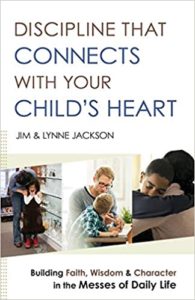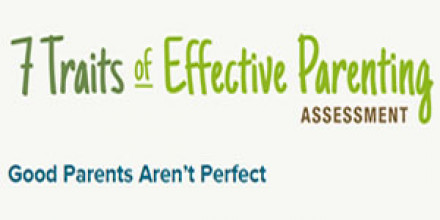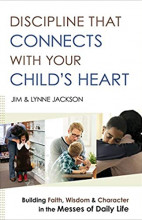
The War of Words
In this Adventures in Odyssey drama, a carelessly uttered word from Eugene creates havoc as it becomes the fashionable insult, resulting in a lesson about the power of words.
Home » Episodes » Focus on the Family Broadcast » Conveying God’s Love Through Discipline (Part 2 of 2)
Excerpt:
Mrs. Lynne Jackson: A better starting question isn’t, what should I do to manage this behavior? But what’s going on? What’s going on in my heart? What’s going on in the heart of my child? Because those are the things that really determine the end result of the discipline.
End of Excerpt
John Fuller: Lynne Jackson and her husband, Jim, are with us again today on Focus on the Family and your host is Focus president and author, Jim Daly. I’m John Fuller.
Jim Daly: John, last time we started a great conversation about parenting. I think it touched every parent’s heart that was listening and I hope you today will stick with us because we’re gonna get back to some very fundamental things that will transform, I think the way that you parent and I think produce the outcome that you ‘re looking for and that is to launch your children at 18, uh, healthy and in a good place spiritually. And it starts with modeling. And our guests, Jim and Lynne Jackson have written this wonderful book, this tool, Discipline that Connects with Your Child’s Heart, not their seat. (LAUGHTER) And I like that.
Mr. Jim Jackson: I’m glad you clarified that.
Jim D.: You could – you could’ve – you could’ve easily put that other one in there and we’d all be saying, “Yes! That’s right, Jim and Lynne.” But, uh, let me just welcome you back to Focus. It’s great to have you back.
Jim J.: Great to be back.
Lynne: Great to be here.
Jim D.: We covered last time four concepts that you have applied and that you’ve capture in your book. Your kids need to feel that they are safe with you as a parent, that you love them no matter what as a parent. You know, some people are already going, okay, strike out, strike out. Don’t worry, we’re gonna equip you to do better and that’s the key. A third, you’re called and capable as you express to your child God’s gifting in their lives that you as a parent recognize those wonderful attributes that they have. And then fourth, that you’re also responsible for your consequences. I mean, you’re gonna bear the brunt of your decision-making. I think that is so critical, because so many parents try to rescue their kids. I’m guilty of that at time, ‘cause I want to be the hero in their lives as their dad and I know mom wants to do the same thing. So, those are the four core things. We covered two of those, the first two, um, last time and if you missed the message, get the download. If you’re a struggling parent, this is the kind of tool that you will need to do a better job.
John: And you’ll find the book we’re talking about at focusonthefamily.com/broadcast. Or when you call 800, the letter A and the word FAMILY.
Jim D.: Jim and Lynne, we signed off last time talking about slow, low and listen and that’s in comparison – and I was laughing, because I think the other one is fast, big and you’re not listening, right?
(LAUGHTER)
Jim D.: I turn to my son…
Lynne: Fast, large and loud.
Jim D.: …And I turned – fast, large and loud. I turned to my son this morning and said, “Which one fits me?” And he goes, “Really, Dad? You really…?”
(LAUGHTER)
Lynne: That was a very authentic safe thing to say. You know, asking for…
Jim D.: Yes. Fast, loud and large, I was going, that couldn’t be a better description of me.
(LAUGHTER)
Jim D.: But let’s educate ourselves as parents in that slow, low and listen concept. Describe it.
Jim J.: Yeah, so, um, fast, large – large and loud.
Jim D.: Stop saying that, would you?
(LAUGHTER)
John: Fat, loud and large.
Jim J.: It’s a tongue twister. Fast – no, no.
Jim D.: I just thought the large part.
Jim J.: Yeah.
Jim D.: We don’t have to go fat, okay?
(LAUGHTER)
Jim J.: Yeah. Yeah. Fast. I can’t even do it now.
(LAUGHTER)
Jim J.: I’ll start with slow – slow, low and listen is important because, um, it keeps the brain calm. It keeps the brain ready to learn. Fast, large and loud puts brains on the defensive. And so, when our kids are on the defensive all they are interested in doing is protecting themselves from whatever is fast, large and loud.
Jim D.: Right.
Lynne: And it doesn’t mean large size. It means intimidating posture.
Jim D.: Just taking up the space verbally, whatever it might be.
Lynne: Well, like fast is like rushing in and spewing verbal commands. “Stop it right now! That’s not okay.” Large is the intimidating postures that we get into – that, you know, putting – have you ever wondered why you put your hands on your hips when you’re upset with your kids?
John: Oh, yes.
Lynne: It’s like a natural inclination to loom larger and more intimidating. And then the loud is when our voice raises and we want to intimidate our kids into submission so that we can get things back under control, ‘cause we’re feeling so internally out of control.
Jim D.: And just to reiterate, those are the things you don’t want to do. (Laughter)
Lynne: Right. Right.
Jim D.: What are the things you do want to do?
Lynne: Those are the things that set off the fight or flight.
Jim D.: Right.
Lynne: So, if you flip all those things and go to slow, low and listen, slow is – can be about taking a step backwards instead of charging in. Um, it can be just walking in slowly. It can be speaking slowly. So, compare the difference between, um, “What going on in here?!” or “Huh, what’s going on in here, guys?” You know, one is fast; one is slow. The slow keeps brains relaxed so that we can engage our frontal lobes and really solve a problem.
Jim J.: One of the helpful phrases that I learned early on that I think a lot of guys particularly would relate to is that forward progress begins with a backward step. My inclination as a dad and I recognized it really on following some of the baggage of my father, you know, that I learned. Dad’s always right. Dad’s in control. Don’t ever mess with Dad. You know, that’s – I grew up with that baggage and I brought it into my family, and I started acting accordingly. And when I took that step forward with my hands on my hips and was fast and large and loud, I scared my kids. And they would do what I wanted them to do and I thought it was working. But what I realized as my daughter particularly grew older and a little more sensitive was, that she was getting more and more distant from, you know, she didn’t want to sit on my lap anymore. She didn’t want me to read the books to her at bed at night. And I realized that when I was the kind of dad that took a backward step, I made a lot more forward progress. Why? Because when I took my backward step (Sound of deep breath), I could breathe. I could – I could – and I – you know, for me, the – the – I would pray just a quick prayer. Lord, give me Your wisdom here instead of my selfishness. “Okay, kids, what’s going on here?” Instead of “What is going on here?!” like Lynne has said.
Jim D.: Lynne, we’ve got slow down. What’s a good example of low and listen?
Lynne: Low is about doing things with your body that calm your brain. So, when you sit down, put your feet up, your – that’s not the position sitting in recliner where you’re going to yell at you kids, because it’s a loop in your brain t0 when I do a calming thing with my body, it calms my brain.
Jim D.: I don’t know. I could get one out in reclining in a chair.
(LAUHGTER)
Jim D.: I’ll have to remember that, though.
Lynne: Not very – not very often.
Jim J.: It’s not natural.
Jim D.: (Laughter).
Lynne: Right. So, getting down on the floor next to your kids. Even just doing something physical, like pushups. There was one mom who would go jogging with her daughter when they worked on a conflict because that was what calmed their bodies.
Jim D.: Man, they could get into shape that way. (Laughter)
Lynne: Yeah, for sure. Simply sitting below your child really has an incredibly calming effect on them.
Jim D.: Listen is self-evident. What would that example be?
Jim J.: Well, it’s self-evident sort of. But – but our inclination when kids are misbehaving is to go in and tell them what to do…
Jim D.: Yes.
Jim J.: …As opposed to ask them what’s going on and what might they want to do about it right now.
Jim D.: So, ask questions.
Jim J.: Ask questions.
Lynne: Yeah. How could…
Jim J.: Open their brains. And again, when we – when we point our finger at them and tell them what to do, brain goes flight or fight. They’re – the – the learning part of their brain shuts down. When we ask them a question, not, “What are you thinking?!” but “What – what are you thinking about right now?”
Jim D.: Jim and Lynne, this is a struggle question because I’ve struggled with this. When you see, uh, what you don’t like in your children, how much of that do you own as a parent?
Jim J.: You mean, like, how much of that is there because you taught them?
Jim D.: Correct.
(LAUGHTER)
Jim J.: Ah, well, it’s – I think it’s real. I think that’s very real and I think to say it out loud breaks some of the power of it. And to confess it as sin and to apologize for it. Um, you know, I remember – again, I’m thinking of lots of stories – but, uh, you know, I was hard on my son for computer games and one day I decided I’m just going to go in and sit down and learn about this computer game instead of just condemn it all the time. What’s – what do you like about it? What’s good about it? And the next day he went to Lynne and said, “I noticed Dad kind of settled down about all of that and instead of fighting…” – he was fighting because I was fighting – “…What’s something cool I could do with him?”
Lynne: “Something that Dad likes that I can do with him?”
Jim D.: Oh, wow.
Jim J.: So – so our kids do imitate our disfunction, but they also imitate our function and to be able to just talk about that out loud and say it for what it is, uh, is a great gift to our kids.
Jim D.: I’m still thinking, Jim and Lynne, of that parent that hears what you’re saying and may even believe that they’re applying several of these principles, but in reality, um, they revert back to that core, control or fear or perfectionism. How do you – literally – how do you get yourself out of that rut? You had to have a, if I could say it this way, a kind of “come to Jesus” meeting, Lynne.
Lynne: Mm-hmm. Yeah, for sure.
Jim D.: And – and, um, for the person that’s kind of in that grey zone still, that parent that’s in the grey zone, they don’t know. Some days I’m achieving it. Other days I’m falling back to my own pattern. How do they break falling into that pattern that they may have learned, Jim, to your point of their own mother and father? Um, how can you consistently change?
Lynne: Mm-hmm, well, one is as we did, we let our kids know what kind of parent we wanted to be. And we equipped them to respectfully confront us when we weren’t that.
Jim D.: Now, that’s good.
Lynne: So, yeah, like Jim shared yesterday of barging in and starting right away to yell at the kids, Daniel was equipped to be able to respectfully confront him and say, “Dad, you didn’t connect first.”
Jim D.: Yeah.
Lynne: Because we had communicated what kind of a parent we wanted to be.
Jim J.: And – and – well, and I was gonna say, and then another key part of answering your question is, that what I did after he said, “Dad, you didn’t connect first,” so he’d been equipped to confront me. He confronted me and instead of saying, “Oh, you’re right, I’m sorry,” I said, “Can I have a do-over?” And I literally went back into the garage. I prayed, “Lord, help me to be more of the dad You want me to be this time.” And I came in a different dad. Well, by the time I got there, the kids had all lightened up anyway and they were different kids anyway. And I just was able to say to them, “You know, I’ve had a rough day at work and I’m pretty stressed and it would be really great if I could have a little quiet time before I engage with you all. If you’re gonna keep arguing like you were arguing, could you take that downstairs?” And they’re like, “No, we’re fine, Dad. We – we’re done…”
Jim D.: (Laughter).
Jim J.: “…It’s all good” And it was – they were done with it and it was fine.
Jim D.: Oh, that’s good.
Jim J.: But, you know, concretely, naming the kind of parents that we want to be moving forward, not the kind of kids we want to have.
Jim D.: Yeah.
Jim J.: And then celebrating when we do that and doing the do-overs that are needed in order to experience some success once in a while, big results from parents that we coach.
Jim D.: Yeah, Jim and Lynne, you mention in your book again that misbehavior is a golden opportunity for unconditional love. That’s a different way of looking at it, too. I mean, so often when the misbehavior occurs, it’s conditional love time. (Chuckling) If you don’t act this way, then you’re not getting my affirmation. How do we better understand that misbehavior is a golden opportunity to show the love of God through us and how God treats us as His teenagers?
Lynne: Yeah, well, it’s a great example of Romans 5:8. It says, “While we were yet sinners” – not while we had our act together – “God demonstrated His love toward us.” And so, that brings the gospel alive. We had a woman come to our seminar and a couple weeks later her boy said, “Mom, why are you smiling now when you discipline us?”
Jim J.: When you discipline us.
Jim D.: (Laughter).
Lynne: When you discipline us.
Jim J.: The discipline is still there.
Lynne: Yeah. And she said, “Because it gives me a chance to remember how much I love you.” Now not every parent is gonna be able to smile in the midst of discipline, but if we can access that heart of love for our kids, then it can begin to really communicate, because most of the time what happens is, parents know they still love their child in that situation, but how they’re acting is the same as they might act if they were, you know, angry with the driver on the road. (Laughter ) And kids form conclusions about that, that you love me when I do well, but not when I misbehave. And so, then love becomes conditional and performance based, and kids grow insecure. And so, these – this misbehavior is – is truly the golden opportunity to get that unconditional love, so that kids can’t miss it.
Jim D.: And again, they’ll reflect that in their lives…
Jim J.: Yeah.
Jim D.: …Now and hopefully later.
Jim J.: One of the things we do with groups in workshops is, we – we close the section where we teach the parents about the importance of love no matter what. And we invite them to close their eyes and imagine, what’s something that you do to communicate love to your child, that you do naturally, that you do well, not when they’re misbehaving, but just any old time? Now picture your child misbehaving and then picture yourself doing that thing that you do to express love to them when everything is fine, when they’re misbehaving. Because if our kids are gonna truly understand that they are loved unconditionally, they’ve got to experience messages of love when they’re feeling their worst.
Jim D.: Jim, I love that. Let’s get practical though. You have a story in your – in your book that describes this scene perfectly. I think it was Andy, the dad and Mitch, the son.
Jim J.: Right, yeah.
Jim D.: I’m sure they’re not the actual names.
Jim J.: Yeah, that’s right.
Jim D.: But describe that scene.
Jim J.: Well, Andy was a – a banker. He was in the banking industry and was a numbers’ guy and a high-powered guy and a get-things-done guy. And his son, Mitch, was wired differently than his dad and began in about fourth grade to struggle with math. And Andy would come home disappointed that my son isn’t, you know, measuring up to my expectations. And he would put parameters and put things in place, which is good to do. It’s important that kids know you can’t go out and play with your kids till your homework is done. But what Mitch started to do is lie about doing his math, because he was so discouraged about it, in order to go out and play with his friends, which is something he loved to do. And, of course, Andy got wind of that through the teachers and one thing led to another and he came to me for help, ‘cause he, “I – I’ve tried grounding him and I’ve tried keeping his friend away and I’m even thinking about pulling hockey. And, uh, he just doesn’t seem to care anymore.” And I said, “Has he heard from you at any point during your struggle with him about math how much you love him?” And he says, “What do you mean? Why would I say that then?” And I said, “Well, I don’t know, because maybe he’s not so sure about it.”
Jim D.: Especially in that moment, that environment.
Jim J.: It – yeah, so, um, he couldn’t think of anything else to do. I said, “You’ve tried – it sounds like you’ve tried all your ideas. Why don’t you try this one?” And he came back to see me a week later with the report that he had tried in a heated – you know, it – it started to ramp up the way it had ramped up and Mitch was getting upset and complaining about math. And Andy was starting feel his ears get red and his veins start to pop in his neck like always and he remember, “Oh, yeah, this is when I’m supposed to say, ‘I love you.’” And so, I took a step back from all of my energy and I took that breath and that – said that prayer that you had helped me remember and I got down on my knee. I was just, like, I don’t even know why, and I said, “Mitch, you just need to know something here in the middle of all this. Math is important. You know that. But I want you to know something way more important. I love you no matter how math goes.” This is, you know, this is a fourth-, fifth-grade young man. He just broke down in tears sobbing and jumped into daddy’s arms.
Jim D.: Hm.
Jim J.: Why? Because he didn’t know until that moment that daddy loves me even when I’m struggling.
Jim D.: Right.
Jim J.: And that’s what our kids need to know. And when they misbehave, we have our greatest opportu – and we could tell you story after story after story of the epiphany that happens for parents when they remember this.
Jim D.: Yeah. Let me ask you, Lynne, because that line of perfection that we talked about last time, this is where the rubber meets the road, because I know people listening, parents right now are saying, “That sounds great, but man, what about performance? I mean, this is a really tough world and you gotta do well. You gotta get to college. You gotta do well. You gotta create an environment where you’re gonna be prepared to go into a vocation that will reward you well.” Where’s that line of – of standard that you can hopefully maintain, loving your child…
Lynne: Yeah.
Jim D.: …But you know what? “You still gotta do well in math.”
Lynne: I love to tell a story about, um, grades and report cards, ’cause it really highlights the difference between the two approaches of managing behavior and trying to get that end result and mentoring belief. So, my tendency was to really push our kids and to be intense about grades and negative and we – our oldest son struggled with ADHD kinds of things. And so, when the grades arrived one day, um, the other two kids had really shiny little report cards and his was, we should say, rather multicolored.
(LAUGHTER)
Jim D.: Not so shiny.
Lynne: Not so shiny. And so, I went to Jim and said, “We need to talk to Daniel about his report card, ‘cause this is not okay.” Um, and he had the wisdom to say…
Jim J.: Being a child who didn’t ever have a shiny report card.
(LAUGHTER)
Lynne: …He had the wisdom to say, “Um, I think I’d like to try something a little different.” And I just instantly got in touch with how micromanaging, negative and critical I was. And I said, “You know what? Go for it, because I can tell I’m not in a good place about this.” So, he calls the kids and says, “Kids, come here. Guess what?” And he said, “We are gonna have a report card party tonight to let you know that we love you absolutely unrelated to these three sets of grades on the table.”
Lynne: And you can imagine their surprises. Well, we got out the Nerf guns and ran around the house, hooting and hollering. And we made popcorn and watched this video and we had a blast. Which child do you think had the most fun?
Jim D.: The one who was forgiven the most.
Lynne: That’s right, the one who was forgiven the most. And then at the end of the night we said, “Daniel, we should really talk about this.”
Jim J.: Yeah.
Lynne: “When would you like to do that?” And he goes, “Oh, not tonight.” “Well, how about tomorrow?” “Sure, tomorrow.” And then we sat down with him and talked about his report card that next day.
Jim J.: Yeah, but the conver – even the conversation then, so he was probably in sixth- or seventh-grade, sixth grade then. And the conversation wasn’t, “This is not up to your potential, young man. You need to do better and we’re gonna remove privileges from you unless you do better.” The conversation was, “Um, you know you’re loved no matter how your grades are. But you also know you’re capable. Why don’t you talk on your report card about some of the grades you’ve got that you are more happy with? What did you do well there? How might you use those in math? And how can we help you be – get the grades you want to get in math, rather than the grades we want you to get in math. What grades do you want to get in math?” And again, I know where you’re going. I hear your brain already. Some – some parents will say, um, well, they don’t care. “I don’t care about my grades.”
John: He just want – a D is fine. A D is fine.
Jim D.: I mean, many will have – will say, “Yeah, that’s great and it works” and parents should definitely try it. But we’re talking to the whole spectrum and that’s why some – some students, some children will say, “You know, I’m doing the best I can.” We gotta recognize that. Maybe they need tutoring, or they need some additional.
Lynne: Right on.
Jim J.: And – and so, the question is, how can I help you? Because what I’ve been doing hasn’t been doing it.
Jim D.: Right.
Jim J.: And sometimes the help comes in the form of just making sure we’re safe and making sure the kids know they’re loved, as we start to call them to accountability. Like if we build that nest of grace with those first two messages, then they’re more inclined to respond to our calls to accountability.
John: Hm. Well, Jim and Lynne Jackson have joined us this past couple of days on Focus on the Family with insights from their book, Discipline that Connects with Your Child’s Heart, and we’ll encourage you to get a copy of the book or a CD of this entire conversation and also to call us if we can be of any help to you. In fact, you can schedule a consultation with one of our Christian counselors. Our number is 800, the letter A and the word FAMILY for all of these resources. Again, 800-A-FAMILY. Or stop by focusonthefamily.com/broadcast.
Jim D.: Jim and Lynne, let’s move it in a positive direction. I mean, we’ve identified those difficult things. The third element of your four that you’ve mentioned is to remind your child that they’re called and they’re capable. That sounds very optimistic. I would gravitate to that. Let’s see what you’re gonna be. Let’s aim for something, uh, that will honor the Lord in your journey as a teenager, as a young person. But you encourage parents to calm down, connect and give choices in order to train them in that direction…
Jim J.: Yeah.
Jim D.: …Which I think is helpful. Describe that.
Jim J.: Well, the calm down part helps me as a parent to see things that I don’t normally see. And the first thing that I started learning to see in both other people’s kids and in our kids, when I could calm myself down was that even when they’re doing things that I wish they weren’t doing, they’re doing things they’re good at. They’re doing things God will use. They’re doing things that God can use for His glory. Um, think of the Apostle Paul. The Apostle Paul, what was he before he was Paul? He was Saul. What was he doing?
Jim D.: Persecuting people.
Jim J.: He was destroying the church. He was – what did it take to be good at what he was doing? He was strategic. He was passionate. He was knowledgeable. He was zealous and Saul – he built teams.
Lynne: Incredible knowledge of the Word.
Jim J.: Incredible knowledge of the Word. Um, it was – it was gift gone awry. When my kids are doing terrible things, if all I see is the terrible things as opposed to the gift beneath it, how in the world am I gonna say to that child, “Wow! Those words you’re using right now, they’re really powerful. They’re hurtful.”
Jim D.: How do you create a plan to avoid that misbehavior? I mean, that is part of the parental role. How do we engage that child who is a brilliant negotiator, but it’s strident and it’s out of a sense of pride?
Jim J.: “So, son, when you talk to me that way…”
Jim D.: Right. (Laughter)
Jim J.: “…Uh, I’m really glad to be hearing from you and I can see that you feel really strongly about what you’re saying. Your words and the way that you’re using them cause me to want to back away, which I’m gonna do until you figure out how to deliver those words more respectfully. It’s up to you when you do that. You let me know.”
Jim D.: And then you just turn and walk away.
Jim J.: Turn and walk away.
Jim D.: Yeah, that is good. I like that. Let’s look at some age-appropriate examples of preparing a plan for them so they can do better next time. Use any example you want, the 5-year-old, the 10-year-old, the 15-year-old.
Lynne: When our kids were little, we were stuck in a pattern of, it was my job to herd them towards bed and it was their job to try to escape…
(LAUHGTER)
Lynne: …’Cause Jim often worked at the – at the youth outreach in the evenings. And so, it was herding defiant cats, you know, for bedtime. And I finally said to them, “You know, guys, do we like how bedtime goes? Do we like how we feel when – when we all get to bed, when – when you guys all get to bed?”
Jim D.: ‘Cause I know I don’t.
(LAUGHTER)
Lynne: I said, “I don’t like feeling angry and disconnected from you at the end of the night.” “We don’t like it either. You’re always so crabby.” And I go, “Yeah, it’s really frustrating and it’s hard as the only parent. So, it sounds like we’re all frustrated. How could we solve this so – so we feel really good about how we end our night together? How do you want to end the night?” “I want to feel close to you. I want to – you know, I – I want to have fun together.” I said, “Okay, well, what can we do?” So, I just put it onto them to make a plan, to come up with how we can make bedtimes more peaceful and connective.
Jim D.: Yeah.
Lynne: And they got to work figuring out a system of rewards and consequences that they knew would motivate them to get into bed, so that I didn’t have to herd them into bed, which was just not a healthy process.
Jim D.: Okay, so here – here’s the big question. This’ll be a million-dollar question. How do you make a plan for them to brush their teeth?
(LAUGHTER)
Jim D.: That seems to be one of the biggest challenges, especially for boys. They don’t see the reason. I mean, “Why brush your teeth, Dad? That just wastes time. I don’t mind if my breath is horrible.”
Lynne: We had a family for whom that was a huge issue and there was huge power struggles over teeth brushing. When they looked at this behavior through the lens of, “You’re safe and loved. You’re capable and you’re responsible,” things began to change. So, the dad began to realize, I need to educate my girls as to what happens when they don’t brush their teeth. So, they went online, and they looked at the germs that grow in the bacteria. They talked about what happens to teeth, because his view was, you are capable of making wiser decisions if you’re simple really well-informed. And, um, they let them know, “Girls, if you don’t become responsible about brushing your teeth, then we’re gonna have to get the sugar out of the house, because that is gonna make it a lot worse and you’re gonna be responsible to pay for your cavities. So, what do you think would be a good plan so that you can, um, take care of your teeth, ‘cause God gave you your teeth. He didn’t give ‘em to me. He gave them to you.”
Jim D.: That is good. I like that.
Lynne: Do you see those four messages?
Jim D.: Yeah.
Lynne: Safe and loved, capable and responsible.
Jim J.: Yeah and there was – there’s a loaded thing in there that parents talk to us about all the time. Well, they don’t care if they have to pay for their cavities, ‘cause they don’t even know what that means. Well, bingo! That’s because they haven’t been taught what that means, and they haven’t experienced the consequence of not having money to get what they want when they want to get the thing that their money would get them.
Jim D.: Now the challenge that you have as a parent is when their dentin is very healthy.
(LAUGHTER)
Jim D.: I can remember having this discussion.
Jim J.: Absolutely.
Jim D.: “You gotta brush your teeth more.” And they get back from the dentist. How many cavities? None.
Jim J.: Yeah, yes.
Jim D.: And you‘re going, no, that can’t be right.
Jim J.: Right.
(LAUGHTER)
Lynne: Our son, our oldest strong-willed one actually learned that lesson when he was in his 20’s. He thought he had teeth of steel…
Jim D.: Perfection.
Lynne: …And did not take care of them and all of a sudden, he found that he was paying for what…
Jim J.: $2,000 or more.
Lynne: …Yeah, $2,000 of den – dentist bills.
Jim J.: I mean, we said, “Buddy, we love ya. Not gonna help you with that one.”
Jim D.: Oh, amazing.
Jim J.: “We’ve been talkin’ to you about this all along.” And that – and our younger – you know, our younger kids, they couldn’t afford a whole cavity, of course.
Jim D.: (Laughter).
Jim J.: But we invited, like that was a loss of allowance money, teaching the value of a quarter, a dime, a dollar and so on and – and the discipline of – of waiting to spend your money just because you want. So, there’s – there’s this big – there’s this great big thing in helping our kids learn you are responsible that plays into that bedtime message, so that when Lynne said, “You’re gonna have to pay for your cavities,” our kids knew what that meant.
Jim D.: Well, and you’re really capturing the fourth of the four, which is that…
Lynne: Mm-hmm.
Jim J.: You’re responsible.
Jim D.: …Responsibility for your actions and that’s terrific. Jim and Lynne, this has been so good. John, have you been…?
John: I’ve been taking notes over here.
Jim D.: Yeah, I could see that and, uh, I think many, many in the audience have found these last two days very, very helpful. Uh, your book, Discipline that Connects with Your Child’s Heart, I think it is chock full of helpful advice, very practical. You have a – at the end, you have a lot of additional, uh, direction for parents to tap into resources that are out there on the website and other places. So, um, it is a wonderful resource. And we want to make that available to you, let me say, the, uh, aspirational parent. You want to do it better? I want to do it better. John, I know you want to do it better. Um, for a gift of any amount, we’ll send you the book so that you can get on the right path and maybe straighten out some of that perfectionism that Lynne was talking about. I can relate to that, too. You want to see behavior modified more than loving your children. Uh, this is a wonderful resource to get you pointed in a better, I’d say more godly direction in your parenting.
John: And I’d just add, Jim, that I think this is a good book for even young adults who need to learn some of the lessons we’ve just been talking about. Again, the book title, Discipline that Connects with Your Child’s Heart. The authors are Jim and Lynne Jackson, and we’ve got copies for you at focusonthefamily.com. Or call 800, the letter A and the word FAMILY. And we’re here to help families like yours. And if you’re in a spot to help with our financial needs and to stand in the gap for parents who are struggling, we’d really appreciate your generous contribution. When you donate today, we’ll send a copy of this great book as our way of saying thank you for joining the support team. On behalf of Jim Daly and the entire team, thanks for joining us today for Focus on the Family. I’m John Fuller inviting you back as we once more help you and your family thrive in Christ.

Jim and Lynne Jackson are media spokespeople for a variety of parenting issues, frequently speaking at churches and conferences. They have conducted over 1,300 parenting workshops and privately coached more than a thousand parents since the early 1990’s. The couple resides in Minnesota and has three children. Learn more about the Jacksons and their work by visiting connectedfamilies.org. You can also follow them on Facebook and Twitter.

Receive our guests' book Discipline That Connects With a Child's Heart for your donation of any amount! Plus, receive member-exclusive benefits when you make a recurring gift today. Your monthly support helps families thrive.

Visit our online store and purchase a CD of today's program for yourself or to share with a friend.

Good parents aren't perfect. And that's okay. There's no formula to follow, but there are ways you can grow every day. This assessment gives parents an honest look at their unique strengths, plus some areas that could use a little help.

A helpful summary of the four guiding messages for peaceful, purposeful discipline that are explored in detail in the Jacksons' book Discipline That Connects With Your Child's Heart.

As you correct your kids in their behavior, they need to hear four messages that affirm them and show them of your love and care.

Who runs your home? Is it you or your child? Use these simple strategies from Dr. Kevin Leman to help you parent your child to be more respectful and well behaved.

Discipline that seeks to build God-honoring identity leads to God-honoring behavior – find out what that means.

If you want your kids to stop whining, teasing and bickering, you need to better understand what your kids' words say about their hearts.

A solid foundation is one of the most important things a parent needs to create in a relationship with their child. Just like a tree, the roots must be set deeply in place before the trunk, branches and fruit can grow,

We need to raise children that are aware of God's love for them and who want to serve Him. As parents, we need to daily challenge them to grow and start out on the journey to spiritual maturity.

Please let us know what you think about our broadcast! To help us provide the best possible programming for you, we need your honest feedback on how we're doing and how we can get better.

In this Adventures in Odyssey drama, a carelessly uttered word from Eugene creates havoc as it becomes the fashionable insult, resulting in a lesson about the power of words.

This discussion offers a preview of Volume #16 “Cultures in Conflict” from the That The World May Know video series, available below.

Debra Fileta will help couples better understand the four seasons of healthy relationships, what to expect during each one, and how to carefully navigate them for a stronger marriage. (Part 1 of 2)

Larnelle Harris shares stories about how God redeemed the dysfunctional past of his parents, the many African-American teachers who sacrificed their time and energy to give young men like himself a better future, and how his faithfulness to godly principles gave him greater opportunities and career success than anything else.

Amy Carroll shares how her perfectionism led to her being discontent in her marriage for over a decade, how she learned to find value in who Christ is, not in what she does, and practical ways everyone can accept the messiness of marriage and of life.

Psychologist Dr. Kelly Flanagan discusses the origins of shame, the search for self-worth in all the wrong places, and the importance of extending grace to ourselves. He also explains how parents can help their kids find their own sense of self-worth, belonging and purpose.